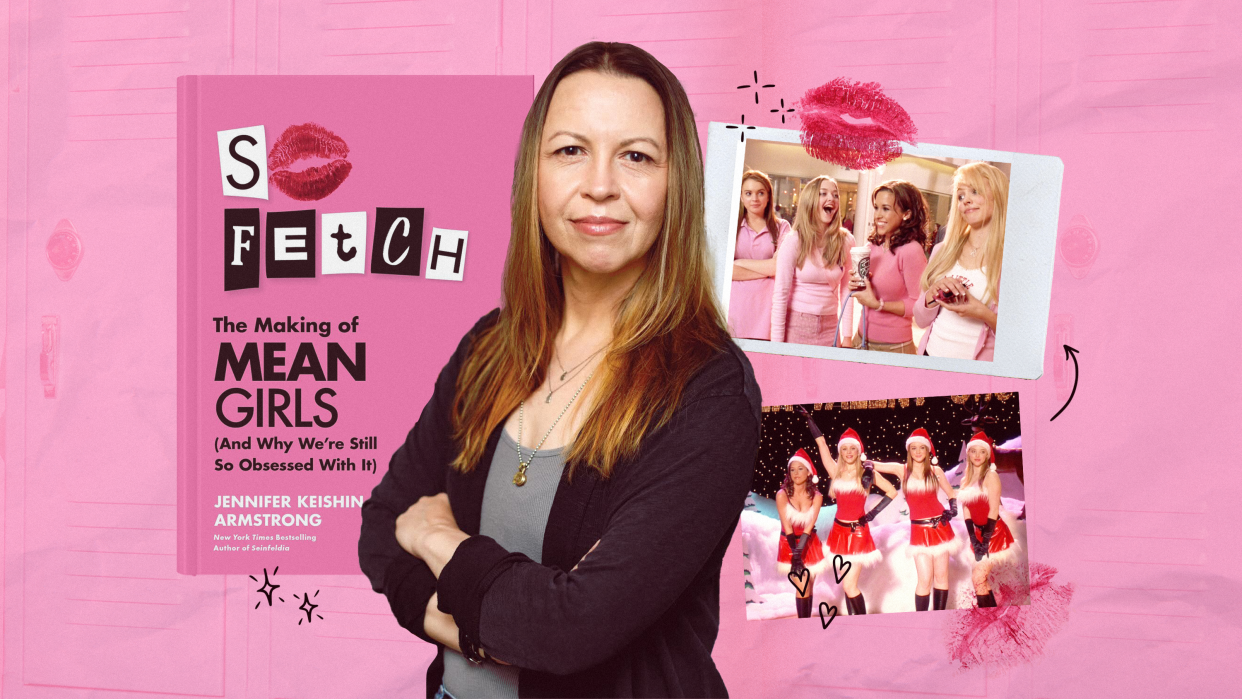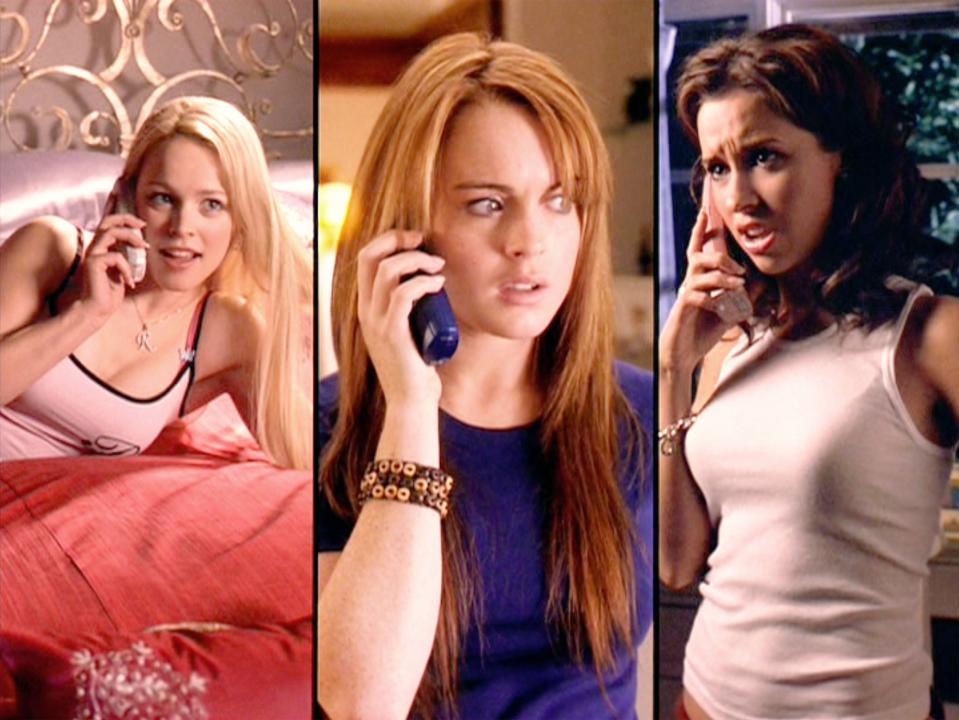How ‘Mean Girls’ Went From a Teen Movie to a Pop-Culture Mainstay

- Oops!Something went wrong.Please try again later.
William Morrow Group/Getty Images
I still remember the first time I saw Mean Girls.
Sitting in that movie theater, watching my childhood hero, The Parent Trap’s Lindsay Lohan, navigating through the twisted and complex world of high school friendships was a revelation. Sure, the movie, written by a not yet super-famous Tina Fey, was hilarious, the outfits were amazing, and the plot entertaining, but what struck me the most in my 14-year-old mind was how real the movie felt, how it seemed to have been made just for me.
Obviously, I was far from alone. In the nearly 20 (gulp) years since the film was released in April 2004, it has become a behemoth, a now classic ode to Millennial girlhood. It inspired a musical, a new movie musical, released earlier this month, and many, many memes.
To celebrate the anniversary of the film’s release, author and entertainment journalist Jennifer Keishin Armstrong, whose book about Seinfeld was a New York Times bestseller, has turned her expertise to Mean Girls. Armstrong spoke to many key players behind the film, including producers, cast, and crew, and sifted through the annals of pop-culture history to examine how the film continues to resonate. Her resulting book, So Fetch: The Making of Mean Girls (And Why We’re Still So Obsessed With It) is a fitting tribute to a film that has become so iconic to multiple generations of young women.
Armstrong chatted with Glamour about how Mean Girls went from movie to meme machine, how teen movies have evolved over time, and why the film has become such a mainstay in pop culture.
Glamour: In the book you track the evolution from Mean Girls the movie to Mean Girls the cultural touchstone. You—rightly, I believe—credit much of its transcendence as a pop-culture phenomenon to its popularity among millennials on the internet. Why do you think we gravitated toward this movie so much?
Jennifer Keishin Armstrong: I mean that’s the big question. A bunch of movies have come out in the years since, and some are almost as good, but why does this one still seem so omnipresent? And [the internet] is really the answer.
So many of the people involved with the movie said there was this lull, essentially. They said, “The movie came out, my life was kind of normal and then all of a sudden I had one line in this movie and I’m being recognized on the street.” And the answer is because now you’re famous as a meme, and actually people see a meme sometimes way more than they might have ever seen a movie. I think they all went through that thing that lots of people go through, which is being annoyed at first that they’re stuck with this thing from 2004, but also being like, “Eh, there are worse things in the world, and in some ways it's been great.” So it’s so strange and specific. Also, the way memes work means that sometimes the meaning changes wildly depending on the context people are using it for. So that part is a little weird as well.
What do you remember about when Mean Girls first came out in 2004? Did you go see it in theaters?
I was in my 20s and was working at Entertainment Weekly, so I was very aware of everything happening, including Mean Girls. I definitely went to see it in a New Jersey theater opening weekend.
For me, the real draw was Tina Fey and the fact that she had written it, because that was at the point when she was becoming pretty famous on Saturday Night Live for doing Weekend Update. She just seemed like such a revelation at that time. She was smart, funny—she just was so fearless in her comedy but still also really embraced being a woman within her comedy, and all of these things together, including my love of teen stuff. I thought, Oh, this is going to be really interesting to see.
What I remember from seeing it is just being so impressed with how funny it was. That was my takeaway: It was funny in this different way, even from something like Clueless, which is the closest thing I think we had to it previously. But Clueless is still really kind of sweet and cuddly, and our main character, who is a little narcissistic at the beginning, is still incredibly sweet. This was letting all of these girls be bad. Even our main character, who’s kind of the good girl of the whole thing, actually goes to the dark side.
I feel like we had a really good spate of fun, interesting movies for girls when millennials were growing up. There was not only Mean Girls, but films like Legally Blonde, Bring It On, and 13 Going On 30, which you point out in the book, came out right before Mean Girls.
I actually watched all of those when I was going into this book. They all do have a similar vibe, actually. Maybe Elle Woods isn’t exactly flawed or going to the dark side, but they’re funnier than some of the other movies before them. And they also have this sort of toughness to them. I love Bring It On, because I was a cheerleader. I was very into them being like, “This is a real thing, and we can have actual drama around this without just denigrating the cheerleader.” The cheerleader had been denigrated for so long in teen movies. It made me really happy.

Mean Girls
How else were these films revelatory in how they portrayed young women compared with teen movies of the past?
With Mean Girls in particular, but to some extent even 13 Going On 30, they’re both just kind of better. They’re just more compelling, These were both movies that allowed their heroines to be a little more flawed, and they’re about romance, but it isn’t just about romance.
In Mean Girls, there is a romantic plot, but he’s a pawn. It’s really about the girls’ relationships with each other. You don’t even believe for a second that Regina cares about Aaron through that whole movie, except as a way to kind of mess with Cady.
I’m not sure we did anything substantially different in the future in Hollywood because of this. We’ve moved toward the more flawed teen heroinesm and we’ve allowed girls and women to be funnier since, but it was a slow slog.
To that point, one thing that really struck me was your opening chapter, in which you observe a group of modern-day tweens watching the movie 20 years later and loving it just as much as we did in 2004. That’s adorable, but I can’t help wondering: Why do they have to watch Mean Girls? Why don’t they have their own version of Mean Girls?
Yeah. I called that meeting with those girls essentially because I wanted to be like, “Well, everybody keeps telling me that it’s catching on with them, but is it true?” And it seems to be true, and I do think part of it is the universality of it and just because it’s so good. But the other part, you’re right, is that there’s a void. There is nothing there for them. They don’t have that. Now it’s getting to a point where moms who loved it when it first came out can start to share it with their daughters, and that’s something too. But it is really weird to think essentially that we are sitting here, and we both know a fair amount about pop culture, and we can’t really come up with something that has taken its place in a meaningful way.
What would that next generation of Mean Girls look like, in your mind?
Mean Girls was special because it was its own thing, right? It’s like, “Here, I’ve presented you this new thing that is just yours, millennial young women…T.” the new Mean Girls would have to be completely different. The whole point of it ism it would have to feel that it comes from a new place, a genuine place reflecting current times from a new writer. And I think that would be really special.
This interview has been edited and condensed for length and clarity.
Originally Appeared on Glamour

